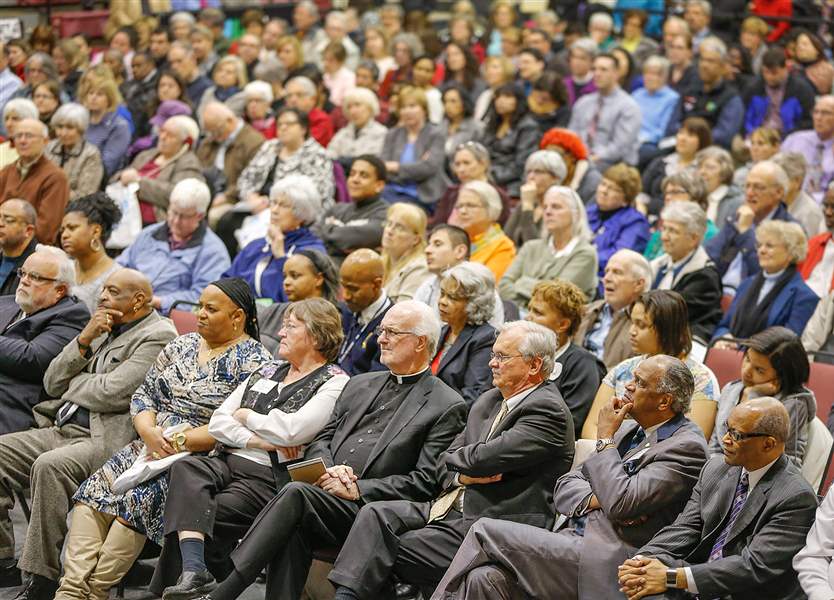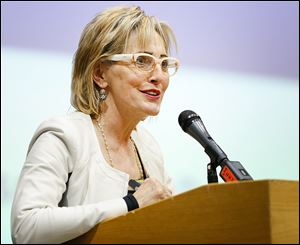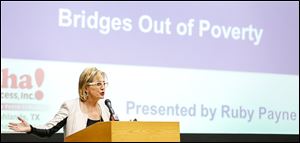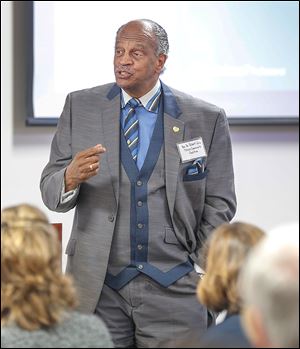
Forum hopes to unlock ‘hidden rules’
Author: Erasing poverty takes a lifetime of effort to achieve
4/4/2014
A diverse crowd attends the forum, including the Rev. Otis Gordon, far right, and the Rev. Robert Culp, second from right. They are co-chairmen of the Toledo Community Coalition, one of the sponsors of the event.
THE BLADE/JEREMY WADSWORTH
Buy This Image

A diverse crowd attends the forum, including the Rev. Otis Gordon, far right, and the Rev. Robert Culp, second from right. They are co-chairmen of the Toledo Community Coalition, one of the sponsors of the event.
Ruby Payne, a national expert on poverty and class, did more than give a speech at Central Catholic High School on Thursday. The former educator conducted a lecture and frequently peppered the audience with questions and asked them to engage in conversation.
The co-author of Bridges Out of Poverty was the featured speaker during the third installment of the “Changing Minds and Changing Lives: Combating Racism” forum. For nearly 40 minutes, she educated and entertained the audience of several hundred with a folksy style tied to her home in Texas.
PHOTO GALLERY: Click here to view photos of the event.
PHOTO GALLERY: Community workshops on poverty.
Amid the laughter, Ms. Payne made some serious points about why poverty, which is so pervasive in our society, is so difficult to eradicate. One of her primary messages is that it takes a sustained effort on the part of a community and on an individual level to “move the needle.”
It takes 12 to 25 years to get critical mass to get momentum, she said. “You have to get about 40 percent of your community with you before you see real progress. A lot of communities have a three-year project and they just give up. You have to stick with it,” she said.
Ms. Payne said in an interview after the speech that people have a distorted view of poverty in this country because, although 67 percent of Americans in poverty are white, “it gets complicated and confused because for 20 video clips on TV about poverty, 18 of the 20 shown are African-American,” she said. This leads to a perception that poverty is a black or minority issue.

Ruby Payne told the audience at Central Catholic that overcoming poverty takes an entire community effort because it is threaded into the fabric of society.
She asserted that one of the reasons that the issue of poverty has never been solved is that the country cannot agree on the root cause. She said the research on poverty has been politicized and that people are divided along ideological lines when it comes to determining why people stay poor.
Those on the left or with a liberal point of view tend to believe the research that attributes the cause of poverty to exploitation (racism, sexism, predators) and problems in political or economic systems that make it difficult for people to move out of poverty. “For example if you don’t have a good credit rating, you can’t get a job,” she said.
Those on the right, with a more conservative point of view, tend to favor the research that points to the choices made by individuals and the lack of jobs.
“The reality, it’s about all four. And when we work with communities we say if your community chooses one research base and only wants to work with one research base, you will never move the needle. You have to address all four of them at four levels — the individual level, the institutional level, the community level, and the policy level,” said Ms. Payne.

Ruby Payne co-authored ‘Bridges Out of Poverty,’ which was later adopted by Lucas County Commissioners in 2006 for training employees so they understand the challenges of people living in poverty and how to move beyond its effects.
She also spent a considerable portion of the discussion on the idea of “hidden rules.” She said each group — those in poverty, the middle class, and the wealthy — have a set of unwritten rules in which they operate.
Those in the dominant culture, or whoever has the most money and power, tend to believe their hidden rules are the best and dismiss those who don’t follow them as unintelligent.
“When you understand the hidden rules, you can operate as a community and it makes a difference,” Ms. Payne said.
The forum also featured a panel discussion after the speech that included Ms. Payne, Cynthia Geronimo, vice president and director of community engagement for the Lucas County Land Bank, and Crystal Harris, director of Youth Opportunity Program at the YMCA/JCC.
Earlier in the day, Ms. Payne blended stories about her family and experiences as a teacher to motivate more than 250 people to tackle poverty in the community.
Community and business leaders, educators, and social service professionals attended two workshops Thursday morning at the United Way of Greater Toledo in downtown Toledo.

The Rev. Robert Culp, pastor of Toledo’s First Church of God and a co-chairman of the Toledo Community Coalition, was one of 100 people who attended a workshop on poverty earlier on Thursday.
The workshops previewed Thursday night’s poverty forum.
Ms. Payne used humor and anecdotes at the workshops to point out the socioeconomic differences that the wealthy and educated often take for granted in conversations about the reasons that generations remain in poverty.
She said “hidden rules” that don’t apply to other classes and the limited vocabulary spoken in their households are among the issues that are holding back people in education and the work force.
She encouraged participants to learn about those hidden rules and social issues particular to the poor to allow everyone to get a better understanding of each other so that no one is offended.
“One of the mistakes we make in communities is that we don’t invite people [who live] in poverty to the table when we are making decisions,” she said.
Lucas County Commissioner Pete Gerken urged community and business leaders in the room for the first session to embrace the principles of communicating across class lines.
“It is time for this community to move. We need the business community. We need the intellectual community. We need the resource community to start reaching back,” he said. “We need the people in this room to understand the work we are doing and take it back to where your rooms and your rules are because we can’t do this in isolation.”
The commissioners adopted the speaker’s Bridges Out of Poverty program in 2006 and had all employees under their authority undergo training so they understand the challenges of people living in poverty and how to move beyond its effects.
“It’s about reaching back and forth across a divide, and this is basically a class divide. Our employees, because of the work they do, have to understand how to bridge that divide,” Mr. Gerken said during an interview after the workshop.
Contact Marlene Harris-Taylor at: mtaylor@theblade.com or 419-724-6091.
Contact Mark Reiter at: markreiter@theblade.com or 419-724-6199.